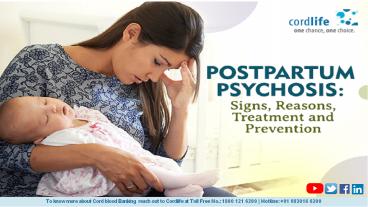Postpartum Psychosis: Signs, Causes, Treatment and Prevention - PowerPoint PPT Presentation
Title:
Postpartum Psychosis: Signs, Causes, Treatment and Prevention
Description:
Apart from your after-delivery bodily discomforts, you might find your mood and emotions to be in a swing. Read this article to get rid of your mental trauma. Visit to know the benefits of cord blood stem cells preservation. – PowerPoint PPT presentation
Number of Views:264
Title: Postpartum Psychosis: Signs, Causes, Treatment and Prevention
1
2
When you give birth to a baby, undoubtedly your
world is filled with extreme happiness and joy.
But this joyous feeling is not the same for all.
Apart from your after-delivery bodily
discomforts, you might find your mood and
emotions to be in a swing. You will have all the
signs of depression for more than 2 to 3 weeks of
your delivery. Such a feeling is known as
postpartum depression. Other than postnatal
depression, you might also be faced with a
serious but rare mental disorder within 2 to 3
days of your babys delivery a condition known
as postpartum psychosis or puerperal psychosis.
(In fact, 1 to 2 out of every 1000 births can
bring about this mental health condition in new
moms after the delivery of the baby). What Is
Postpartum Psychosis? Psychosis is when youve
lost touch from reality. And postpartum
psychosis, is when you have bipolar disorder,
schizophrenia and other scary mental illness
within a few days of your babys birth.
3
Symptoms This condition will occur in you
suddenly. Your symptoms may vary from the
symptoms of the other new mums, but the most
common postpartum psychosis symptoms are
- Your feeling of delusion, in which you might feel
someone is trying to harm your baby - You will have auditory hallucinations, in which
you will get to hear suggestions to either harm
yourself or your baby. - You will feel irritated, anxious, confused and
extremely depressed - You can feel hyperactive or highly energised
- Youll feel very suspicious about everything
around you
- Youll feel disconnected with your new-born
- You may have a feeling of disorientation
whether it is the place or time - You may experience severe insomnia
4
- Reasons For Such Mental Ill-health
- There is apparently nothing proven about the
postpartum psychosis causes, but some
clarifications do exist. And they are - Your after-delivery hormonal changes like the
fluctuation of oestrogen, progesterone, andor
thyroid hormones - If you previously had episodes of psychosis or
someone in your family earlier had mental health
issues - If youve taken psychiatric medicines during the
pregnancy days, and stopped them for some reason
- Your environmental or biological factors
- If you have a history of bipolar disorder
- If this is your first baby
- If you had huge mood swings during your pregnancy
days - If youve been feeling sleep deprived
- If you had a traumatic childbirth
- If youve given birth to subsequent babies.
5
- Treatment of Postpartum Psychosis
- Management of this condition involves a
combination of treatments and therapies. Some of
them are - You need to be hospitalised for your own safety.
Therefore, you should make your partner and other
members in your family aware of this condition
since your pregnancy days. After a week or two of
your babys birth, if your loved ones think you
have postpartum psychosis symptoms, they can call
the medical emergency immediately. And
hospitalisation is required till such time that
your symptoms are relieved and your mood is
stable. - Youll be given medicines like lithium to
stabilise your mood, reduce your hallucination,
panic attacks, improve the hormonal imbalances
and lower your risk of further complications.
Some of the antidepressants are also recommended
to relieve the signs of anxiety, sadness and to
keep you away from the intention of harming
yourself and your baby. - But in case the other treatments have failed to
give you a sense of relief, electroconvulsive
therapy (ECT) is often found to be an effective
postpartum psychosis treatment method.
(Electroconvulsive therapy (ECT) is an invasive
form of brain stimulation that has been used
earlier in cases of major depression and bipolar
disorder). - You can also manage your stress and anxiety by
talking things out maybe with the help of a
support group or with a specialist.
6
Prevention Make sure that your healthcare
provider, during your days of prenatal or
postnatal care not just looks into your pregnancy
or postpartum related physical and medical
issues, but also looks into your entire
bio-psycho-social model. The doctors will
prefer quick screening methods to identify your
signs at an early stage of your postpartum and
will guide you with the right postpartum
nutrition and physical activity. With proper
treatment, you might recover from postpartum
psychosis within 2 to 12 weeks. However, some
of you may need 6 to 12 months time more, but
very soon, you will feel like yourself again and
shower your little one with lots of love and
care. You can also visit the blog page of
Cordlife India, to understand more about
childbirth, parenting, pregnancy and cord blood
banking.
7
Source https//www.cordlifeindia.com/blog/postpar
tum-psychosis/

